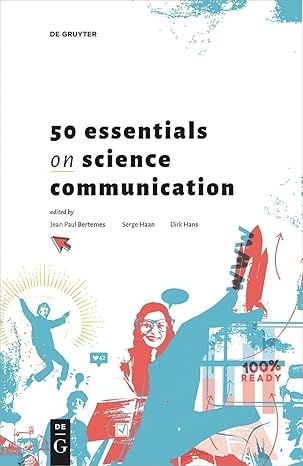
|
FreeComputerBooks.com
Links to Free Computer, Mathematics, Technical Books all over the World
|
|
- Title: 50 Essentials on Science Communication
- Author/Editor(s) Jean Paul Bertemes, Serge Haan and Dirk Hans
- Publisher: De Gruyter Mouton; 1st edition (April 1, 2024); eBook (Creative Commons Licensed)
- License(s): Creative Commons License (CC)
- Hardcover/Paperback: 136 pages
- eBook: PDF
- Language: English
- ISBN-10/ASIN: 3110763265
- ISBN-13: 978-3110763263
- Share This:

|
This handy and entertaining book provides the basics of goal-oriented science communication. It is aimed at career-building scientists and anyone who wants to take their first steps in the field of science communication.
About the Authors- Jean-Paul Bertemes: Head of Science in Society at the Luxembourg National Research Fund and Editor-in-Chief of science.lu.
- Miscellaneous and Uncategorized Books
- General and Popular Science (Biology, Chemistry, Physics, etc.)
- Artificial Intelligence (AI), Machine Learning, etc.

- 50 Essentials on Science Communication (Jean Paul Bertemes, etc.)
- Book Homepage (PDF, Overview, etc.)
-
 Transparent Minds in Science Fiction (Paul Matthews)
Transparent Minds in Science Fiction (Paul Matthews)
Explores the intersection between neuroscience and science fiction stories, argues that psycho-emotional science fiction writers both imitate and inform alien and post-human consciousnesses through exploratory narratives and metaphor.
-
 Creativity: Process and Personality (Larry Gross)
Creativity: Process and Personality (Larry Gross)
Exploring the nature of creativity, this book remains a provocative consideration of how creativity takes form, while also operating as a revealing snapshot of mid-twentieth century psychological thought.
-
 Creating Through Mind and Emotions (Mário Ming Kong, et al.)
Creating Through Mind and Emotions (Mário Ming Kong, et al.)
The goal is to establish a multidisciplinary platform for presenting, interacting, and disseminating research. The idea of book has been a powerful motor for development since the Western Early Modern Age.
-
 Real-Life Decision-Making (Mats Danielson, et al.)
Real-Life Decision-Making (Mats Danielson, et al.)
This book is an attempt to remedy this shortcoming of our educational systems and possibly also of our common, partly intuition-based, decision culture. Intuition is not at all bad, quite the contrary, but it has to co-exist with rationality.
-
 Seeing Ourselves Through Technology (Jill Walker Rettberg)
Seeing Ourselves Through Technology (Jill Walker Rettberg)
Selfies, blogs and life logging devices help us understand ourselves. This book uses examples to explore the balance between using technology to see ourselves and allowing our machines to tell us who we are.
-
 Why Knowing What To Do Is Not Enough?
Why Knowing What To Do Is Not Enough?
It explains the reasons for the gap between 'knowing' and 'doing', focuses on the role of non-cognitive capacities, such as setting goals, taking action, persevering and coping with setbacks, and shows how these capacities are undermined by adverse circumstances.
-
 Paths: Why is Life Filled with so many Detours?
Paths: Why is Life Filled with so many Detours?
This book explores the amazing similarity between paths taken by people and many other things in life, and its impact on the way we live, teach and learn. Offering insights into the new scientific field of paths as part of the science of networks, etc.
-
 Mind Hacking: How to Change Your Mind for Good in 21 Days
Mind Hacking: How to Change Your Mind for Good in 21 Days
Teaches you how to reprogram your thinking - like reprogramming a computer - to give you increased mental efficiency and happiness. Learn to take charge of your mind and banish negative thoughts, habits, and anxiety - in just 21 days!
-
 The Secret of Success (William Walker Atkinson)
The Secret of Success (William Walker Atkinson)
One of the most influential books written on the subject of attaining success. Although everyone's definition of success may be different, the common ground is the attainment of each one's particular goal. The key point to this book is that of 'individuality'.
-
 How Humans Judge Machines (Cesar A. Hidalgo, et al)
How Humans Judge Machines (Cesar A. Hidalgo, et al)
A detailed examination of people's reactions to machine actions as compared to human actions. Through dozens of experiments, this book explores when and why people judge humans and machines differently.
-
 AI for Everyone? (Pieter Verdegem)
AI for Everyone? (Pieter Verdegem)
We are entering a new era of technological determinism and solutionism in which governments and business actors are seeking data-driven change, assuming that Artificial Intelligence is now inevitable and ubiquitous.
-
 Routledge Handbook of Chinese Medicine (Vivienne Lo, et al.)
Routledge Handbook of Chinese Medicine (Vivienne Lo, et al.)
This book is an extensive, interdisciplinary guide to the nature of traditional medicine and healing in the Chinese cultural region, and its plural epistemologies. It will be of interest to practitioners, patients and specialists, etc.
-
 RNA, the Epicenter of Genetic Information (John Mattick, et al)
RNA, the Epicenter of Genetic Information (John Mattick, et al)
Documents the confused early history of DNA, RNA and proteins - a transformative history of molecular biology like no other. Integrates the influences of biochemistry and genetics on the landscape of molecular biology.





